| Login | ||

Healthcare Training Institute - Quality Education since 1979
CE for Psychologist, Social Worker, Counselor, & MFT!!

Section
1
The Gift of Anger
Question 1 | Test | Table of Contents | Printable Page | Introduction
David W. Earle, LPC
First counseling session—September 30th
ELI, THERAPIST: Good seeing you again.
JACK, CLIENT: I’m glad I’m back. I now realize that I am a large part of my problems, and more importantly, no one can change them but me. What is on the agenda today?
ELI, THERAPIST: Whatever you want to work on.
JACK, CLIENT: Well, until I learn how to control my anger, I will continue to piss everyone off!
ELI, THERAPIST: Well then, should we start on anger management today?
JACK, CLIENT: Anger management? Isn’t that an oxymoron?
ELI, THERAPIST: Although they may seem to be conflicting, they actually belong together. Let’s talk about why anger is a human trait. Why were we created with the ability to get angry?
JACK, CLIENT: Beats me. Anger never worked for me. When I get angry, it seems to hurt everyone, and doesn’t do any good.
ELI, THERAPIST: Do you think the ability to get angry is something good, or something evil . . . even something demonic?
JACK, CLIENT: I know no good has come from my anger! I get depressed when I think about the harm it has done to my family. I’m sure it contributed to the failure of my marriage, and I know I’ve harmed my kids.
ELI, THERAPIST: You’ve certainly paid a high price for your anger.
JACK, CLIENT: Yes . . . you can say that again . . . for both me and the people I harmed.
ELI, THERAPIST: What does anger do for us? Is there any value in anger, and if so, what is it?
JACK, CLIENT: "Do for us"? Come on, Eli, Therapist, I’m paying good money for these sessions! Anger does something for us. Forgive my sarcasm, but does anger make our wives love us more? Do our children think we are "cuddly" and "cute" when we shout at them? Is that what you mean?
ELI, THERAPIST: No, I was thinking something more in the positive sense. Can anger somehow build a relationship? You certainly seem to have experience with the opposite effect.
JACK, CLIENT: Yeah, I really blew it. It was my entire fault. That is why she left me. Sometimes I wish there was a way to remove my anger—permanently!
ELI, THERAPIST: Can anger ever be positive?
JACK, CLIENT: I have never seen it.
ELI, THERAPIST: Anger provides two benefits. There are two reasons why we need anger…Two reasons why humans have the ability to get angry.
JACK, CLIENT: Two? Benefits?
ELI, THERAPIST: Yeah, two benefits. Could you survive in this world without the ability to get angry?
JACK, CLIENT: I think I’d like to try.
ELI, THERAPIST: Okay, maybe it is not the anger itself, but how we use the anger that is the problem. Let’s talk about what would happen if a person did not have the ability to get angry.
JACK, CLIENT: I’d like some of that!
ELI, THERAPIST: Before you sign up for losing your ability to get angry, you might want to hear this:
Before the invention of psychotropic drugs, back in the 30’s and 40’s, in mental health hospitals, there was very little doctors could do for a violent patient—other than put them in straight JACK, CLIENTs and confine them to padded cells.
Doctors believed they had no other choice than to perform what’s called a frontal lobotomy. The operation consisted of cutting the nerves to the frontal lobes, the area of the brain that experiences feelings.
JACK, CLIENT: Maybe that’s what I need . . . a frontal lobotomy. No feelings.
No anger. Simple, problem solved!
ELI, THERAPIST: It’s only used now in extreme cases, and your anger does not qualify, the key for you is the management of emotions, not the elimination.
Now, getting back to the old mental health wards—after the operation, the patients could not get angry. You could slap them in the face and they would register no emotion. That operation allowed them to be cared for in the mental health hospital, but could that person survive on the street?
JACK, CLIENT: I don’t think so.
ELI, THERAPIST: Of course not. Anger is a key survival tool in any culture with any group of people. So, anger does two things for us. First, anger is an early warning system. Anger is your radar for incoming insults, threats, or other attacks. Without this radar, we could not react in time, and might be consumed by today’s equivalent of Tyrannosaurus Rex.
JACK, CLIENT: So you’re saying I couldn’t survive without anger.
ELI, THERAPIST: Correct, you need your anger to protect yourself.
The key word is manage, Jack. You need the ability to get angry. But just because you are angry doesn’t mean you have to continue to hurt the people you love.
JACK, CLIENT: I really don’t believe you. Sorry.
ELI, THERAPIST: Quite all right, just don’t discount what I am saying. Try not to judge it.
JACK, CLIENT: Okay . . . just trust you . . . as in "The check is in the mail"?
ELI, THERAPIST: Good one, but yes, you can trust me! Once the anger alerts us to the threat on our radar screen, the second gift of anger is the necessary energy to deal with the attack. Should I fight or should I run? Do I need to face T. Rex head-on or run for my life? Just like the fight or flight syndrome, anger is natural. It is another way we respond to threats, or perceived slights, offenses, etc. What are some of the symptoms of anger?
JACK, CLIENT: You mean like yelling and screaming.
ELI, THERAPIST: Yes, those are definite signs of anger. What I was thinking about were symptoms such as a rush of adrenalin, shortness of breath, racing heart, temperature change, muscle tension, clenched fists, agitation, and shaking.
JACK, CLIENT: Oh yeah, like when I’m angry I clench my teeth, it causes my jaw muscles to ache.
ELI, THERAPIST: Exactly.
JACK, CLIENT: I grind my teeth at night. Is that a sign?
ELI, THERAPIST: Anger is one of the causes. And when anger is triggered it evokes some or all of these other emotions: irritation, tension, frustration, hurt, fear and rage. Those strong emotions often are the reasons people can act aggressively, out of control, and say or do something that is not normal for them, which they later regret.
JACK, CLIENT: Do you have an example of how it can be used correctly? I am still having trouble seeing any merits to anger.
ELI, THERAPIST: Do you remember seeing Dr. Martin Luther King and his followers marching in Selma, Alabama during the Civil Rights Movement back in the 60’s? People my age watched it on small black and white TV sets where we had to adjust the rabbit ears to get the reception just right.
JACK, CLIENT: Is that when they came over that bridge and all the cops, with fire hoses and guard dogs, attacked them?
ELI, THERAPIST: That is what I was remembering. Can you imagine the courage it must have taken, walking arm-in-arm off that bridge, singing "We Shall Overcome", and marching into that sea of angry white faces?
JACK, CLIENT: Yeah, that would have taken guts.
ELI, THERAPIST: Yes, I don’t know if I could have been that courageous marching off the Pettis Bridge. Their basic desire was for a better life with equality and respect. The energy that propelled these courageous people was their collective anger. Black people had hundreds of years of abuse, and it was that anger that gave them the necessary courage. This residual store of anger provided the energy they needed to demonstrate their plight to the world.
They were not armed, nor did they wish to inflict harm on those who tormented them. They used this anger to summon the courage and strength to stand up for themselves. In this case, anger was used correctly.
JACK, CLIENT: Okay, I never thought about that.
ELI, THERAPIST: Mahatma Gandhi used that same collective nonviolent anger in the fight to gain independence from Great Britain after the Second World War. So, back to my point: to have a successful relationship you need anger.
JACK, CLIENT: In that case, my marriage was a resounding success! I had a lot of anger!
ELI, THERAPIST: The operative word in using anger to build relationships is correctly. What you experienced was allowing anger to destroy your love. The anger in itself was not the problem. The lack of anger management and the inappropriate expression of this anger is what doomed your relationship . . . sucked the love right out of it!
JACK, CLIENT: "Sucked the love out" is definitely correct. So . . . can you show me how to control my anger?
ELI, THERAPIST: Let’s discuss a time that you lost it because of your anger. Think of a time you got angry—a memorable time that you lost it
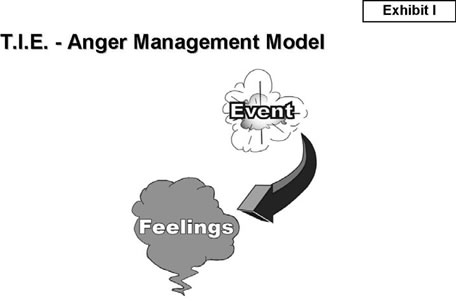
JACK, CLIENT: Okay, my teenage daughter was going to sneak out of the house one night, and her older brother tipped me off about her intentions. I waited downstairs and when she reached the door, I surprised her, and began yelling and screaming. I’ll never forget the look on her face as she ran for her room . . . total fear. She shrunk into a corner with a look of absolute terror on her face.
As I look back on that experience, the sad part is the satisfaction I felt about how well I’d taught her this lesson. Time would prove that I had not, but at that moment, I was sure she would never try this again.
ELI, THERAPIST: Jack look at this feelings chart (page 18), and under the MAD column, tell me what emotions you were experiencing when you caught your daughter attempting to sneak out.
JACK, CLIENT: Angry. Disapproving. Enraged. Furious. Hostile, Rage . . yeah, lots and lots of rage!
ELI, THERAPIST: Now, look at the chart and see what feelings you might have had that are listed under the columns of HURT, SAD, and FEAR.
JACK, CLIENT: Just angry . . . really angry!
ELI, THERAPIST: Humor me, Jack Put yourself back in that moment and look at the FEAR column. See anything that you might have been feeling?
JACK, CLIENT: Okay, I was alarmed. I mean, she was a teenage girl . . . it was the dead of night.
ELI, THERAPIST: Alarm. Okay, what else? And in this discussion you don’t have to explain your feelings, just identify them.
JACK, CLIENT: Alarmed. Fearful. Frightened. . . . Horrified. And in the HURT column: Burdened, Disappointed, and Pained. Is disrespected on this list?
GLAD |
SAD |
FEAR |
HURT |
|
Agitation |
Admiration |
Abandoned |
Alarm |
Aloof |
Angry |
Affection |
Agonized |
Anxious |
Ashamed |
Annoyed |
Ardor |
Bored |
Apprehension |
Belittled |
Antagonism |
Confident |
Crushed |
Bashful |
Burdened |
Arrogant |
Cordiality |
Deflated |
Bewildered |
Cheated |
Bitter |
Curiosity |
Depressed |
Cautious |
Contempt |
Contempt |
Delight |
Disconnected |
Confused |
Denied |
Defiant |
Desire |
Disparaged |
Distraction |
Deserted |
Disapproving |
Devotion |
Distant |
Dread |
Disappointed |
Disdain |
Ecstasy |
Distraught |
Embarrassed |
Dismay |
Disgust |
Ecstatic |
Distressed |
Envious |
Embarrassed |
Disgusted |
Elation |
Downcast |
Evasive |
Exhausted |
Enraged |
Enthusiasm |
Forlorn |
Fearful |
Guilty |
Flustered |
Excitement |
Gloomy |
Flustered |
Humiliated |
Frustrated |
Fervor |
Grieving |
Frightened |
Hurt |
Furious |
Flush |
Helpless |
Horrified |
Insulted |
Hostile |
Generosity |
Hopeless |
Hysterical |
Lonely |
indignant |
Happy |
Ignored |
Inadequate |
Mean |
Irritated |
Hope |
Isolated |
Insecure |
Pain |
Livid |
Hopeful |
Jealous |
Menaced |
Pained |
Mad |
Inspiration |
Melancholy |
Overwhelmed |
Regret |
Mischievous |
Love-Struck |
Miserable |
Panic |
Shame |
Rage |
Passion |
Mournful |
Pathos |
Suffering |
Resentful |
Pride |
Remorse |
Shock |
|
|
Sympathy |
Sad |
Shocked |
|
|
Thrilled |
Unwanted |
|
|
ELI, THERAPIST: No, it is not, however your experiencing disrespect is important. But let’s put that aside for a few minutes. Alarmed. Fearful. Frightened. Horrified. Burdened, Disappointed, and Pained. I am going to use the T.IE. Anger Management Model and I’ll explain what the "T.I.E." means later but here are the emotions you listed:
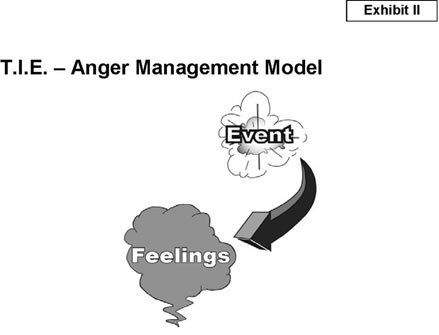

ELI, THERAPIST: You had the event, your daughter trying to sneak out, and then you had the feelings. Now, if we are not careful, we tend to have a reaction.
JACK, CLIENT: I had a reaction all right!
ELI, THERAPIST: When we react emotionally, we often say or do something that we later regret, and probably would not have done if we were not so emotionally charged. Exhibit III shows the reaction.
![]()
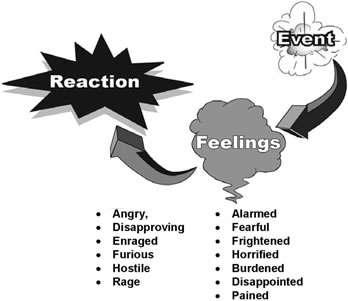
JACK, CLIENT: I really hurt her with my reactions. . . my anger was an explosion! That is what made me realize that something was wrong with me . . . like I was some kind of a monster.
ELI, THERAPIST: Emotional reactions can be very destructive. When we allow our emotions to control us, then we react as in "E over I" . . . Emotions over Intellect.

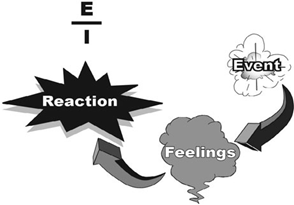
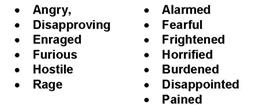
JACK, CLIENT: So the "E" in this model stands for our emotions and the "I" stands for intellect—how we think?
ELI, THERAPIST: Yes. When a person’s emotions are in control, it is very similar to a person who is inebriated. For the purposes of this lesson, people who are "E over I" we are going to call "emotionally drunk". Even when a person has not had alcohol in 20 years, they still can be "emotionally" drunk when their emotions are in control.
JACK, CLIENT: I see. I was hurting the people I loved with my emotions so badly, they had to join me! We all were emotionally drunk.
ELI, THERAPIST: Your love was real, but because you were not managing your emotions, the love you were trying to express came out as "Nazi nurturing."
JACK, CLIENT: Yes, I see. I wanted to express the nurturing love of a father, but the way it came out is not the way I wanted . . . like a Nazi Storm Trooper.
ELI, THERAPIST: Sometimes when we are trying to do our best, we end up doing the wrong thing—often for the right reasons.
JACK, CLIENT: My heart says what I was trying to do was right, but my mind can’t let go of the image—that look on her face. I wish I could take it all back. But I can’t. Just talking about it is helping, though.
ELI, THERAPIST: Good. Getting honest about what is in our heads and in our hearts provides some relief to the pain and shame we experienced in these situations.
JACK, CLIENT: Spilling my guts helps?
ELI, THERAPIST: Yes, honesty is very cathartic. One of the slogans of a 12-Step program is "We are as sick as our secrets." Okay, if being "E over I" is where we don’t want to be, let's now discuss where we want to be.
I’ m going to draw a big "X" over the E over I. (See Exhibit V)
![]()
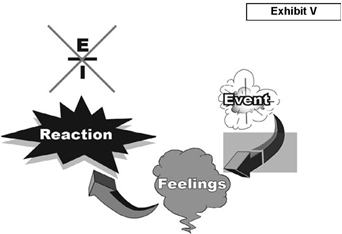

ELI, THERAPIST: Okay, tell me, what happens in your brain between the actual event and the feelings?
JACK, CLIENT: I’m not sure if I understand you.
ELI, THERAPIST: I’ll put it another way: your feelings. . . your emotions, what are they based upon? What is happening in your head that is causing these feelings?
JACK, CLIENT: Expectations?
ELI, THERAPIST: Close. How about thoughts? Your feelings and emotions are based upon your thoughts. Two people can witness the same event and have two different thoughts about it, which can create different emotions.
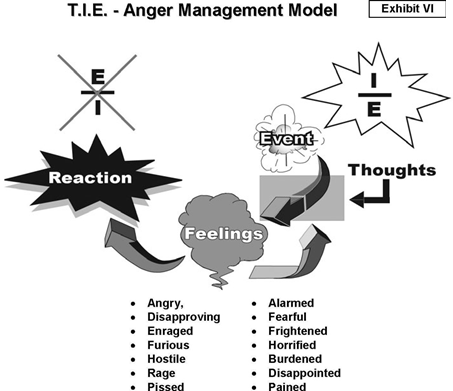
JACK, CLIENT: So, when I have feelings, they are based upon thoughts.
ELI, THERAPIST: Correct. Now, think back to the third grade when you studied icebergs. You found out that ninety percent of the iceberg is under the water. The expression "tip of the iceberg" refers to that part of the iceberg that’s out of the water, what we can see. Emotions are like the iceberg with anger being the tip. When a person is angry, it is often the anger that is so visible and easily observed. However, beneath the anger there are other feelings driving the anger.
Take your example: in the experience you had with your daughter sneaking out, you were, by your own account very angry.
JACK, CLIENT: I’ll say.
ELI, THERAPIST: I wrote down the words you used to describe what you were feeling. They all were found in the MAD column. You listed, "Angry, Disapproving, Enraged, Furious, Hostile, Rage". These emotions are what your daughter observed that night. She saw your anger.
JACK, CLIENT: Yes.
ELI, THERAPIST: For the purpose of this exercise, the angry feelings you expressed are the tip of the emotional iceberg. Let’s ignore these emotions, and explore the feelings that were driving that strong anger reaction. What emotions are under the anger? A little while ago, I wrote down that you said you were "Alarmed, Fearful, Frightened, Horrified, Burdened, Disappointed, and Pained".
Now, take off the anger words in your list and pick out one or two of the other emotions that best describe what you were feeling that night.
JACK, CLIENT: Afterwards, when I reflected upon that night, it was the Pain and Shame. However, when I caught her sneaking out, well it was Fear. That is the best word to describe it—just a lot of Fear.
ELI, THERAPIST: You felt the shame after the event, but during the sneaking out caper you felt fear. Now, in order to get to the thought, you need a certain realization and it comes in a two-part sentence.
The first part of the sentence is: our feelings do not lie to us. Whatever you are feeling . . . you are feeling! Now, I will get to the second part in a few minutes.
Some people may attempt to squash your feelings with statements such as "You’re not really feeling that way!" or "You shouldn’t feel that way"! The truth is, whatever you are feeling is yours and no one has the right to tell you how to feel.
JACK, CLIENT: I like that.
ELI, THERAPIST: Is it okay for people to be angry?
JACK, CLIENT: Well, no . . . look at all the damage I caused.
ELI, THERAPIST: Was it the anger that caused the problem, or was it how you expressed that anger?
JACK, CLIENT: How I expressed it.
ELI, THERAPIST: All right then, is it okay to hurt someone when you are angry?
JACK, CLIENT: No.
ELI, THERAPIST: So, it’s obvious that no one has the right to hurt someone else with their anger. Some people, however, are surprised to know that it is okay for us to be angry.
JACK, CLIENT: That’s a shock to me!
ELI, THERAPIST: Remember, you were born with the ability to get angry. Humans could not survive without it. You need your anger. Civilization just needs a better method for expressing this anger because hurting another person just because we have angry feelings cannot be justified. As simple as these concepts appear to be, many people have never thought it through and are confused with devastating results!
You keenly felt the destructive force of your anger, how it enslaved you with destructive results. Tell me, JACK, CLIENT, would you like some freedom?
JACK, CLIENT: Freedom? Yes.
ELI, THERAPIST: Have you ever heard someone say, "He makes me so angry? "or "She really makes me mad?"
JACK, CLIENT: I say that all the time, people really can get my goat. I know people who consistently make me angry . . . like about half the drivers on the freeway.
ELI, THERAPIST: Let me give you some wonderful information . . . some great freedom will come from knowing this.
JACK, CLIENT: I’m waiting.
ELI, THERAPIST: Here it is: No one can "make" you angry! No one can "make" you mad!
JACK, CLIENT: Sorry, but I know some people who certainly can! My family knows my buttons and boy, can they push them!
ELI, THERAPIST: Let me clarify what I just said. No one can make you angry without your permission. Don’t get me wrong, some people give us great opportunity to be angry, especially our loved ones who know where all our buttons are located, and what reaction comes with each button they push. What I mean is that anger . . . your anger . . . is a choice! You can choose to be angry or you can choose not to be angry.
I remember when I first learned this profound wisdom. I did not believe it when I first heard it. I had spent forty-two years easily being angered.
So the idea that I had some degree of control over my anger was completely alien to my experiences. Even though I did not believe it, I was fortunate in that I did not discount that concept, for as life would have it, very shortly afterwards I had the chance to prove that concept for myself.
I locked my keys in the car! I felt that old rage come up inside me and I was ready to smash my car window. Looking back on my reaction, it’s obvious that breaking the window didn’t make sense. But at the time it was exactly what I wanted to do.
Then I somehow remembered to ask myself, "Do you really want to be angry about this, or not?" And I said, "No!" And I stopped being angry! I was then free. I knew then, that I could choose to be angry, or I could choose not to be angry. What freedom!
JACK, CLIENT: Wow! I never knew that I had a choice. If I can do that, if I can choose, you’re right . . . that is freedom.
ELI, THERAPIST: Okay, our time is up for today shall we make another appointment?
JACK, CLIENT: Can’t wait.
Anger is a choice.
QUESTION
1
Eli, Therapist said that Anger is a key survival tool in any culture with any group of people. So, anger does two things for us, such as? To select and enter your answer go to Test.

